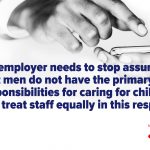
I was yesterday honoured to take part in a round table discussion organised by the Government’s Gender Equality Office. The purpose was to discuss how men can become ‘agents of change’ and support gender equality.
It was a fascinating discussion and the quality of the participants was exceedingly high. I won’t name them all as it would sound like I was name dropping, but Jenny Willott MP opened the session and Professor Michael Kimmel, a well respected sociology and gender studies expert, was also there and gave a fascinating presentation.
These kind of discussions are generally held under Chatham House Rules and the same applied here. I can’t, therefore, reveal what was spoken about.
During the afternoon, however, we had a coffee break and this presented the opportunity for me to have an informal chat with Tina Miller, Professor of Sociology at Oxford Brookes University. The Professor made a comment that is blindingly obvious, yet I’d never considered.
Professor Miller has carried out studies into both motherhood and fatherhood, the latter culminating in a book called Making Sense of Fatherhood. I confess I haven’t read it, but I am assured a copy is in the post so I can read it for myself.
During the course of her research, Professor Miller has spent a lot of time with expectant mums and dads. She said that mums and dads often have the very best intentions while preparing for the arrival of their chid(ren). The plan is to organise their life around their families. There may be an intention to reduce work hours, split household chores and childcare etc.
When the baby has arrived, however, couples in the UK have to deal with a harsh reality. The intention may have been to live a family-focused life but in reality they wind up leading a work-focused life and family is forced to fit around it.
Apparently the reverse is true in Northern Europe. If you’re in the office beyond 6pm and have a family, your colleagues will ask why you’re still there (I’ve heard the same of other European nations, such as Belgium, where you’d be considered very odd for choosing to work late over going home to your family).
I thought about my own personal circumstances and this rang very true. Before I left my old job, my wife and I made a huge effort to balance work with family life. The amount we spent on childcare was eye-watering. To be frank, we just couldn’t make it work and so I eventually jumped ship to work part-time.
Bearing in mind my present situation, this discussion was very timely. My wife and I have decided, with two children and both of them having different needs, that it’s no longer tenable for me to work part-time. Having one child at school and the other being a toddler is just too complex if work is thrown into the equation, even if it isn’t any more than a few hours a week.
I’ve been doing a mix of freelance and employed work for a while now. I’m at the tail end of my notice period as an employee and I can’t wait. In my head and heart, the family has been right at the centre of my life for years. In reality I have been balancing different and conflicting needs. Yes I’ll have freelance clients, but I’ll be deciding who I work for and when. It’s going to be a huge and positive change.
What is your experience? Do you think you lead a work-focused life or is your life truly family-centred? Did you have the best intentions to co-parent, only for reality to intervene?







3 thoughts on “Do you REALLY lead a family-centred life?”
Good luck. For me its like the boiling frog syndrome. I reluctantly work full time and although I appreciate being a full time carer for kids is tough I want to make it my goal to begin taking steps to have a day off a week 🙂
Good luck with that Tom. I hope you do get your day off and spend more time with the kids.
Pingback: Do you REALLY lead a family-centred life?